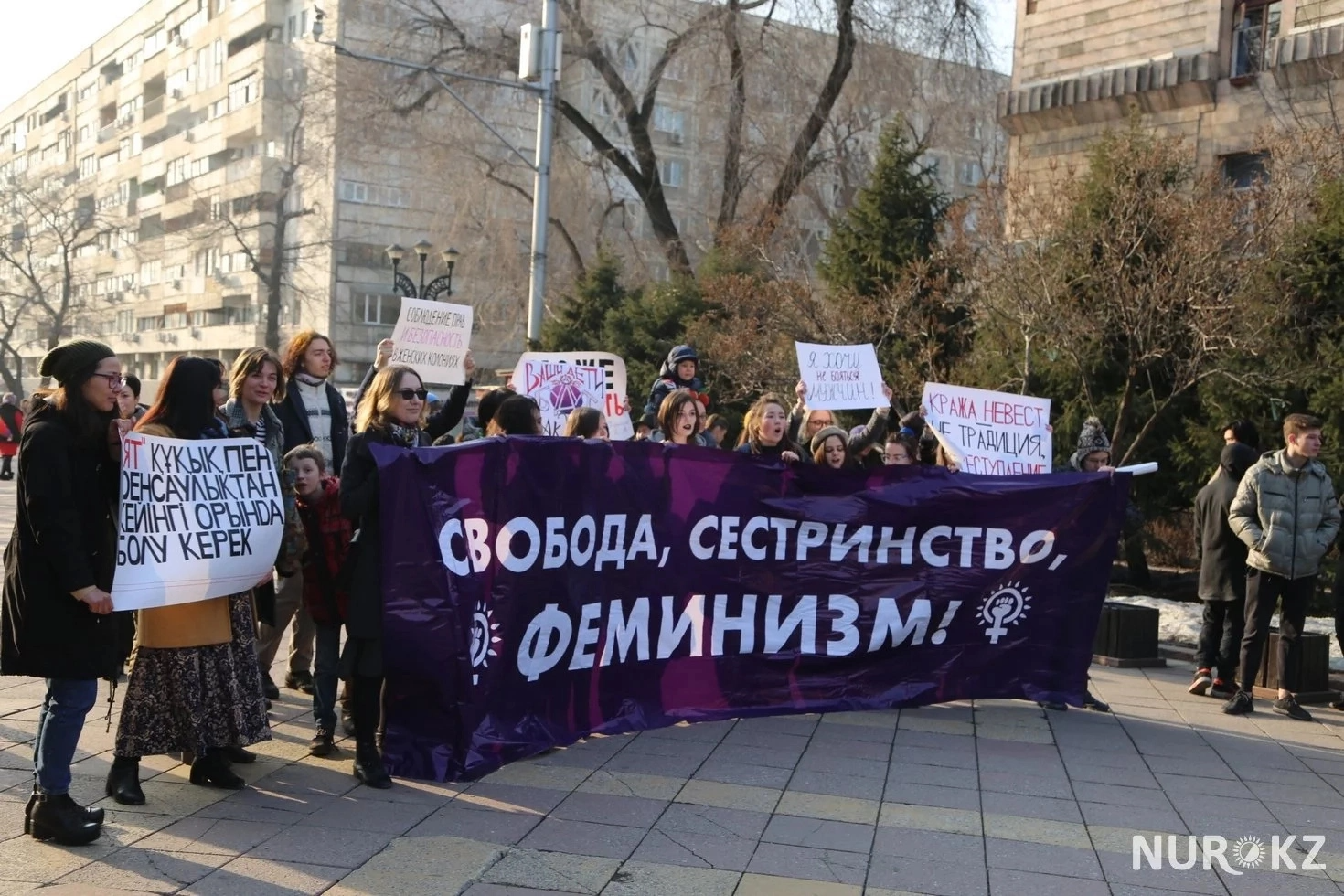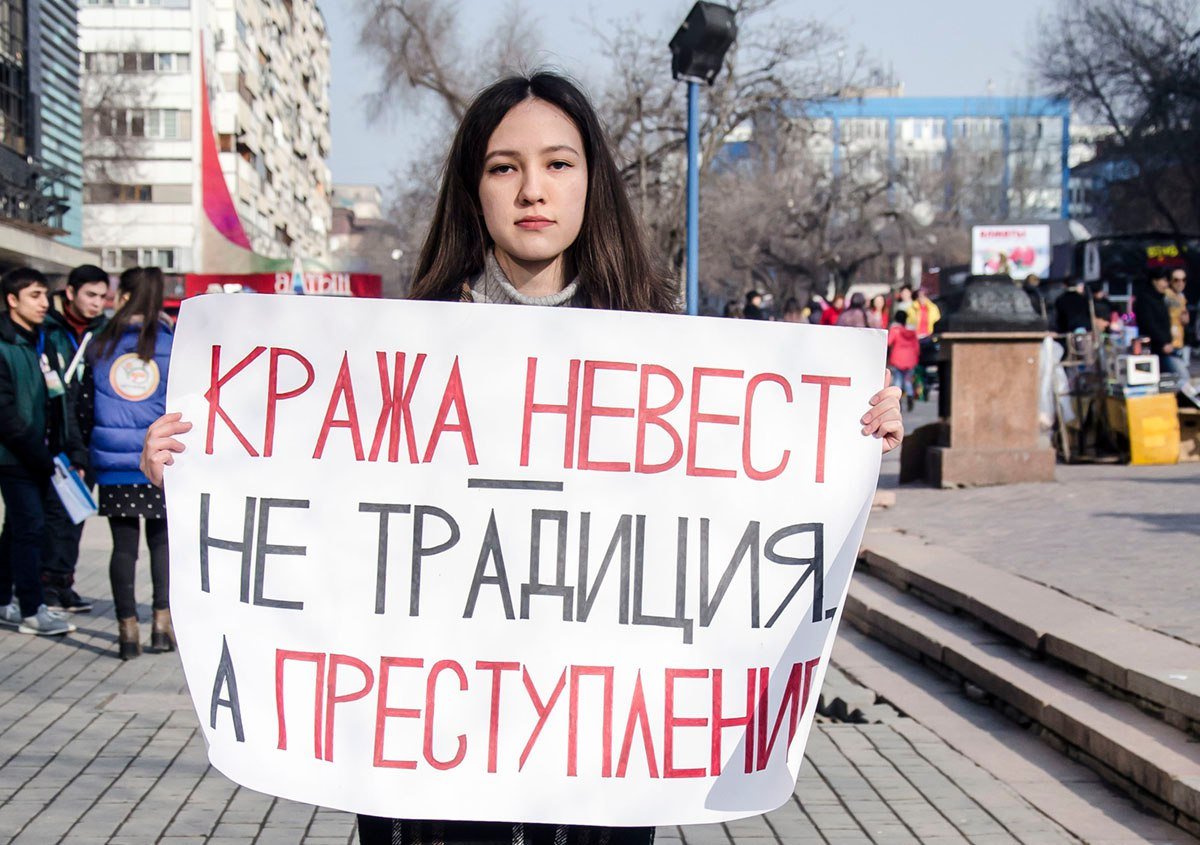The Un-wed Kazakh Girl
The Everyday struggles of a 21-year old Kazakh girl trying to find a place for feminism in Post-Soviet Mentality.
By Karla Noor
Karla Noor is Fashion and Culture journalist and blogger currently based in London and studying Law.
Staying true and finding yourself is tough. To some it is even tougher at home, somewhere where anyone would expect at least some understanding, support and encouragement. Whenever I am back, in Kazakhstan, I constantly feel this pressure, this unhealthy weight that our women carry. I have so many great friends but too many of them advise me along the lines of ‘Oh, Karla, you should wear more makeup’ ‘put on a dress’ ‘show more of this’ ‘show less of that’ ‘be more girly,’ and it’s constant.
It’s true, I do not fuss over my looks too much. I leave the house without any make up on. I love wearing comfy clothes. Imagine being judged for wearing something which, keeps you comfortable and warm; your mom telling you that what you are wearing is impeding on her hopes you’ll get married, as if getting married to the right guy, from the right family is the whole purpose of your existence.
Marriage is still portrayed as centrepiece to living in Central Asian countries like Kazakhstan, Russia and Uzbekistan. A lot of feel they Kazakh women are expected to have the whole package in order to attract the right husband. Dress well, act proper, study well, know languages, be good at makeup, have beautiful hair, keep their nails in check, stay a virgin until marriage, marry before 25, cook well, be tidy and the list goes on.
Many girls chase ‘perfection’, because of the pressure put on them to get married and it does not take long for one to see the despair in their eyes if these goals are not met. They think that if they do not get married before 25 their lives are over, if they do something drastic or unconventional with their appearance no ‘proper’ guy will want to date them, if they have sex before marriage everyone in their circle of friends and many others will slut-shame them, even their boyfriends. These are true and realistic threats and fears girls my age have as this is what society in modern day Kazakhstan tells them.
The country that has sworn to be secular, democratic and equal. Sadly, the truth is far from the papers. There is a huge problem with discrimination, inferiority complexes and abuse.
Women are still mainly considered to be second-class, no matter all the legal rights they have. De facto they are second-class and it was not a surprise to many, earlier this year when the domestic abuse was decriminalised both in Kazakhstan and Russia.
This new law allows domestic abusers to get away with their crime the first time they do it, if the injuries are not severe enough for hospitalisation. The people behind this change say that it has been done for a ‘greater good of protecting the institution of family and marriage’. By normalising abuse? What kind of a family are we talking about here? Can one really rely on a tyrant to build a good family. The most troubling part is that there are still hardly any organisations or programs that can help women overcome abuse or set up movements to empower themselves.
Maria Alekhina, a member of the Pussy Riot punk group, said that during her two year long imprisonment between ¼ or a third of the women she met there were imprisoned for attacking their abusive husbands. Double standards? So the men cannot be imprisoned but the women can?“
More than 600 women are killed in their homes every month in Russia, this data was taken from a wide police statistics.”(bbc.com) In 2016, a pro-women group called KazFem held demonstrations against the unequal treatment of women in the centre of Almaty, a cultural capital of Kazakhstan. The news of the protest has been met by a great deal of polarized comments.
Their feminism was highly regarded as something akin to mental disorders or a major vice and a lot of women supported these opinions. They think a ‘real woman’ has to stay at home, look after the children and look after oneself to stay beautiful for their husband. The husband traditionally only has to provide money, he is expected to come home, eat, watch TV and that is all. Even if he cheats people instantly assume that something was wrong with his wife or that it is a natural thing for a man to do. And, the wife has to endure; she cannot leave the husband, ‘because where would she go, right?’ Her family will most probably see her as a disgrace and she would always have to bear the stigmatised label of a divorcee. Above: A woman does not owe anything to anyone.
This is a very simplified version of what are the real struggles and duties of a Kazakh woman and many others in the post-Soviet countries. These women are heroines. The saddest part is that the majority do not and might not ever realise that.
The slogan above says: Freedom, sisterhood, Feminism!(all photos taken from nur.kz, photographer: Darina Matskih) The main page for KazFem is on vk.com, the main social media platform used by the majority of the people from post-Soviet countries. Vk.com seems to be one of the few platforms that women can share their thoughts about feminism and violence against women on. The group has only 1,636 members; this is really not surprising, given the social stigma and the prevailing mentality towards women. However, this is also a very young group and was only set up in 2015. The most popular community on there about Feminism is called Overheard Feminism, but it only has 17,653 members. It is definitely better than 1,636 but this i a representation of a following within the whole of the post-Soviet countries.
In the above vk.com communities, the members regularly publish questions and anecdotes about the lives of women they know and their own struggles of achieving recognition. Recently, one of the members has shared her experience at one of the business conferences. There she has met a couple of the most influential businesswomen of Russia. Funnily enough, when asked about their thoughts on feminism they have reacted with disgust. They said that feminism is for crazy stupid girls that do not know what to fight for, because they have rights already.
The problem is not just in the rights, but knowledge and education. Unless women realise for themselves that they need change, that they need to stand up for their rights, that they have rights to begin with, there will be no improvements and the glass-ceiling will never be broken.
Partly I understand why, the country is in a great divide; there is a great deal of social and cultural polarisation.
Bride kidnapping is still more widespread than you would think. It is not as bad as in Kyrgyzstan but the figures are not far off. In Kyrgyzstan, around 12,000 young girls are kidnapped each year. And no one does anything about it, because it is the norm. Even the women who want to file a case usually are met with humiliation and judgement for trying to imprison her own husband, for being a crazy woman, who definitely deserved to be abused and for trying to save her own life she will be beaten up again.‘
Bride kidnapping is not a tradition but a crime.
’How to break through this? Some would say it takes time. But look at the post-Soviet countries. Misogyny is a norm, discrimination is a norm, domestic abuse is a norm. There are no plans for improvements because it suits the authorities and the men.
The whole world is talking about feminism and female empowerment. Things are getting better but there are places in the world that are stagnant. The only way out I see is through raising awareness, getting books and educational materials to these girls while it is not too late.
There are too many questions, too many problems and not enough time to philosophise. The statistics are not promising. Kazakhstan is in the 1st place among all of the post-USSR countries for female suicide of all ages. These figures point us to the fact that it is not just about domestic abuse but the whole spectrum of potential problems and shortcomings within the society and families.
At the moment, all I hope for is that maybe articles like this will encourage women to stand up for themselves and realise that they were born to be great and strong, and not be subject to archaisms and neglect.



